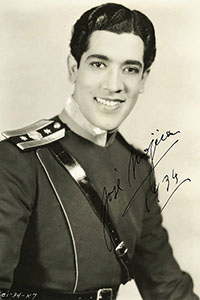The History of The Tenor Narrated
The History of Jose Mojica

Born: September 14, 1895
Died: September 20, 1974
Mexican Tenor
Narrative 1
The Mexican lyric tenor, Jose Mojica, 1896 to 1974, is a different proposition altogether.
He started singing small roles, at the Mexico City opera and by 1916, he was tackling some of the important roles such as Alma Viva in the Barber, Arturo Lucia, Rodolfo Boehme, and Faust.
He thought by now, that he might try New York and ended up washing dishes.
Back in Mexico City, he continued his stage experience, and eventually in 1919 he was offered an engagement at Chicago, as Arturo in Lucia di Lammermoor.
This was a success and he returned there regularly each season, until 1931. He even had a greater role there as the prince, in the world premiere of Procopius opera, Love for Three Oranges.
Yes, the very same opera that we heard about earlier in this tape, regarding the current Edinburgh Festival production.
Whilst in Chicago, we are interested to learn that he took further vocal instruction from our old friend, Lucian Muratore.
But now the film world took over and he became a successful film star singer, appearing in many films.
None unknown now, but they did include, The Price of a Kiss, we’ve got to get the Prince Married, One Mad Kiss, The King of the Gypsys, The Cross and the Sword, Frontiers of Love, and the Song of the Miracle.
His mother was a great influence in his life and when she died suddenly, he entered a Franciscan monastery in Peru. Although he did re-emerge from time to time to sing or write his autobiography.
A little opera and a song then perhaps.

